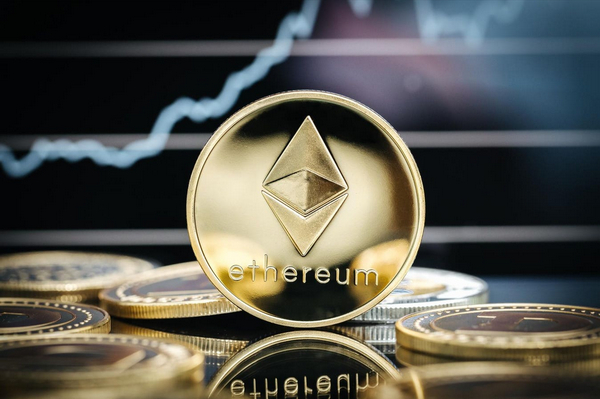-
 Bitcoin
Bitcoin $106,437.2012
0.82% -
 Ethereum
Ethereum $2,442.5287
0.82% -
 Tether USDt
Tether USDt $1.0005
-0.02% -
 XRP
XRP $2.1812
-0.27% -
 BNB
BNB $645.1327
0.45% -
 Solana
Solana $146.2379
0.39% -
 USDC
USDC $0.9999
-0.01% -
 TRON
TRON $0.2751
0.92% -
 Dogecoin
Dogecoin $0.1662
-0.23% -
 Cardano
Cardano $0.5827
-1.22% -
 Hyperliquid
Hyperliquid $37.5225
0.04% -
 Bitcoin Cash
Bitcoin Cash $479.0877
4.02% -
 Sui
Sui $2.7846
-3.27% -
 Chainlink
Chainlink $13.3576
0.84% -
 UNUS SED LEO
UNUS SED LEO $9.0252
-1.20% -
 Stellar
Stellar $0.2455
-1.07% -
 Avalanche
Avalanche $18.0680
-1.81% -
 Toncoin
Toncoin $2.8948
-1.07% -
 Shiba Inu
Shiba Inu $0.0...01164
-1.65% -
 Litecoin
Litecoin $85.0637
-0.06% -
 Hedera
Hedera $0.1526
-0.89% -
 Monero
Monero $316.2941
0.78% -
 Ethena USDe
Ethena USDe $1.0003
-0.04% -
 Polkadot
Polkadot $3.4113
-1.87% -
 Dai
Dai $1.0000
-0.01% -
 Bitget Token
Bitget Token $4.4488
5.16% -
 Uniswap
Uniswap $7.1740
3.09% -
 Pi
Pi $0.5968
11.43% -
 Pepe
Pepe $0.0...01010
-0.65% -
 Aave
Aave $264.3189
0.40%
how ethereum smart contracts work
Ethereum smart contracts, programmed in Solidity and immutable once deployed, automate business processes on the Ethereum blockchain, offering automation, immutability, and transparency while posing challenges like complexity, security, and cost.
Oct 16, 2024 at 02:53 am

How Ethereum Smart Contracts Work
Ethereum smart contracts are self-executing programs that run on the Ethereum blockchain. They are used to encode business logic and rules into code, and then to automate the execution of those rules. This can save time and money, and can also help to improve accuracy and transparency.
How do Smart Contracts Work?
Smart contracts are developed using a programming language called Solidity. Solidity is a high-level language that is specifically designed for writing smart contracts. Once a smart contract is written, it is compiled into bytecode. This bytecode is then deployed to the Ethereum blockchain.
Once a smart contract is deployed, it becomes immutable. This means that it cannot be changed or modified. The only way to change a smart contract is to deploy a new one.
Smart contracts can be used to automate a wide variety of tasks. For example, they can be used to:
- Manage financial transactions
- Create and manage digital assets
- Control access to resources
- Execute legal agreements
Benefits of Smart Contracts
Smart contracts offer a number of benefits over traditional contracts. These benefits include:
- Automation: Smart contracts can automate the execution of tasks. This can save time and money, and can also help to improve accuracy and transparency.
- Immutability: Smart contracts are immutable. This means that they cannot be changed or modified. This can help to improve security and trust.
- Transparency: Smart contracts are transparent. This means that anyone can view the code and verify its functionality. This can help to build trust and confidence.
Challenges of Smart Contracts
While smart contracts offer a number of benefits, there are also some challenges associated with their use. These challenges include:
- Complexity: Smart contracts can be complex to develop. This can make them difficult to understand and maintain.
- Security: Smart contracts are not immune to security vulnerabilities. If a smart contract is not properly designed and implemented, it could be exploited by hackers.
- Cost: Deploying a smart contract to the Ethereum blockchain can be expensive. This can make it difficult for businesses to use smart contracts for high-volume applications.
Despite these challenges, smart contracts are still a promising technology. They have the potential to revolutionize the way that we do business and interact with the world around us.
Disclaimer:info@kdj.com
The information provided is not trading advice. kdj.com does not assume any responsibility for any investments made based on the information provided in this article. Cryptocurrencies are highly volatile and it is highly recommended that you invest with caution after thorough research!
If you believe that the content used on this website infringes your copyright, please contact us immediately (info@kdj.com) and we will delete it promptly.
- Bitcoin Price Soars to $106,596: Is This the Recovery We've Been Waiting For?
- 2025-06-25 12:25:14
- XRP Ledger's New Era: Batch Transactions and Token Escrow Take Center Stage
- 2025-06-25 12:45:12
- JasmyCoin: Price Prediction & the Quest for New Highs
- 2025-06-25 12:25:14
- Arctic Pablo Coin: The Meme Coin Primed for Lift-Off? Plus, Bonk & SHIB Updates!
- 2025-06-25 12:45:12
- BigBear.ai, AMD, QuantumScape: Stocks Soar and Solid-State Batteries Get Real!
- 2025-06-25 12:50:13
- Bitcoin, Ethereum, and the Iran-Israel Ceasefire: A Crypto Market Update
- 2025-06-25 13:05:13
Related knowledge

How to customize USDT TRC20 mining fees? Flexible adjustment tutorial
Jun 13,2025 at 01:42am
Understanding USDT TRC20 Mining FeesMining fees on the TRON (TRC20) network are essential for processing transactions. Unlike Bitcoin or Ethereum, where miners directly validate transactions, TRON uses a delegated proof-of-stake (DPoS) mechanism. However, users still need to pay bandwidth and energy fees, which are collectively referred to as 'mining fe...

USDT TRC20 transaction is stuck? Solution summary
Jun 14,2025 at 11:15pm
Understanding USDT TRC20 TransactionsWhen users mention that a USDT TRC20 transaction is stuck, they typically refer to a situation where the transfer of Tether (USDT) on the TRON blockchain has not been confirmed for an extended period. This issue may arise due to various reasons such as network congestion, insufficient transaction fees, or wallet-rela...

How to cancel USDT TRC20 unconfirmed transactions? Operation guide
Jun 13,2025 at 11:01pm
Understanding USDT TRC20 Unconfirmed TransactionsWhen dealing with USDT TRC20 transactions, it’s crucial to understand what an unconfirmed transaction means. An unconfirmed transaction is one that has been broadcasted to the blockchain network but hasn’t yet been included in a block. This typically occurs due to low transaction fees or network congestio...

How to check USDT TRC20 balance? Introduction to multiple query methods
Jun 21,2025 at 02:42am
Understanding USDT TRC20 and Its ImportanceUSDT (Tether) is one of the most widely used stablecoins in the cryptocurrency market. It exists on multiple blockchain networks, including TRC20, which operates on the Tron (TRX) network. Checking your USDT TRC20 balance accurately is crucial for users who hold or transact with this asset. Whether you're sendi...

What to do if USDT TRC20 transfers are congested? Speed up trading skills
Jun 13,2025 at 09:56am
Understanding USDT TRC20 Transfer CongestionWhen transferring USDT TRC20, users may occasionally experience delays or congestion. This typically occurs due to network overload on the TRON blockchain, which hosts the TRC20 version of Tether. Unlike the ERC20 variant (which runs on Ethereum), TRC20 transactions are generally faster and cheaper, but during...

The relationship between USDT TRC20 and TRON chain: technical background analysis
Jun 12,2025 at 01:28pm
What is USDT TRC20?USDT TRC20 refers to the Tether (USDT) token issued on the TRON blockchain using the TRC-20 standard. Unlike the more commonly known ERC-20 version of USDT (which runs on Ethereum), the TRC-20 variant leverages the TRON network's infrastructure for faster and cheaper transactions. The emergence of this version came as part of Tether’s...

How to customize USDT TRC20 mining fees? Flexible adjustment tutorial
Jun 13,2025 at 01:42am
Understanding USDT TRC20 Mining FeesMining fees on the TRON (TRC20) network are essential for processing transactions. Unlike Bitcoin or Ethereum, where miners directly validate transactions, TRON uses a delegated proof-of-stake (DPoS) mechanism. However, users still need to pay bandwidth and energy fees, which are collectively referred to as 'mining fe...

USDT TRC20 transaction is stuck? Solution summary
Jun 14,2025 at 11:15pm
Understanding USDT TRC20 TransactionsWhen users mention that a USDT TRC20 transaction is stuck, they typically refer to a situation where the transfer of Tether (USDT) on the TRON blockchain has not been confirmed for an extended period. This issue may arise due to various reasons such as network congestion, insufficient transaction fees, or wallet-rela...

How to cancel USDT TRC20 unconfirmed transactions? Operation guide
Jun 13,2025 at 11:01pm
Understanding USDT TRC20 Unconfirmed TransactionsWhen dealing with USDT TRC20 transactions, it’s crucial to understand what an unconfirmed transaction means. An unconfirmed transaction is one that has been broadcasted to the blockchain network but hasn’t yet been included in a block. This typically occurs due to low transaction fees or network congestio...

How to check USDT TRC20 balance? Introduction to multiple query methods
Jun 21,2025 at 02:42am
Understanding USDT TRC20 and Its ImportanceUSDT (Tether) is one of the most widely used stablecoins in the cryptocurrency market. It exists on multiple blockchain networks, including TRC20, which operates on the Tron (TRX) network. Checking your USDT TRC20 balance accurately is crucial for users who hold or transact with this asset. Whether you're sendi...

What to do if USDT TRC20 transfers are congested? Speed up trading skills
Jun 13,2025 at 09:56am
Understanding USDT TRC20 Transfer CongestionWhen transferring USDT TRC20, users may occasionally experience delays or congestion. This typically occurs due to network overload on the TRON blockchain, which hosts the TRC20 version of Tether. Unlike the ERC20 variant (which runs on Ethereum), TRC20 transactions are generally faster and cheaper, but during...

The relationship between USDT TRC20 and TRON chain: technical background analysis
Jun 12,2025 at 01:28pm
What is USDT TRC20?USDT TRC20 refers to the Tether (USDT) token issued on the TRON blockchain using the TRC-20 standard. Unlike the more commonly known ERC-20 version of USDT (which runs on Ethereum), the TRC-20 variant leverages the TRON network's infrastructure for faster and cheaper transactions. The emergence of this version came as part of Tether’s...
See all articles
























































































